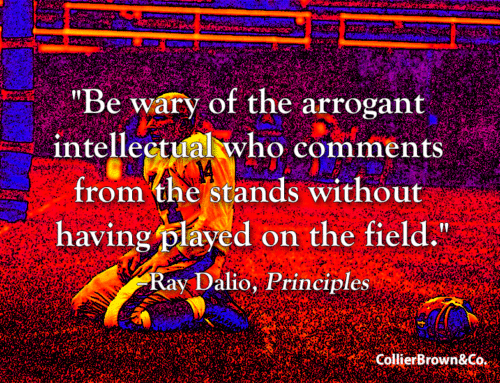“We hold these truths to be self evident, that all men are created equal, that they are endowed by their Creator with certain unalienable Rights, that among these are Life, Liberty and the pursuit of Happiness.”
With these words, our founding fathers began a proclamation to the world that America was a democratic republic. In 1776, assembled Representatives of the original thirteen colonies wrote the Declaration of Independence.
History has not been overly kind to great civilizations. They tend to be great for only a couple of hundred years before they decline.
I’m not so much a student of history as I am of why things fail or succeed. One of the primary reasons that organizations slip into decline is they forget their raison d’être. They fail to remember, drift, lose, abandon, ignore, contaminate, relinquish, give up, surrender, cede, or turn their backs on the “why” that bought them into existence in the first place. I suspect the same is true of great civilizations, cultures and countries.
The United States has the opportunity, the calling, to be different. As a government of, by and for the people, “the people” are vested with the power. Unless, of course, they forget. Relinquish. Abandon. Lose.
Wise leaders have always issued warnings.
On America’s 100th birthday, James Garfield, the 20th President, as he delivered his centennial speech to Congress in 1876 said,
“Now, more than ever before, the people are responsible for the character of their Congress. If that body be ignorant, reckless, and corrupt, it is because the people tolerate ignorance, recklessness, and corruption. If it be intelligent, brave, and pure, it is because the people demand these high qualities to represent them in the national legislature. If the next centennial does not find us a great nation it will be because those who represent the enterprise, the culture, and the morality of the nation do not aid in controlling the political forces.”
Henning Webb Prentis, Jr., President of the Armstrong Cork Company delivered a speech in New York during the 250th meeting of the National Conference Board on March 18, 1943. Prentis had this to say:
“Paradoxically enough, the release of initiative and enterprise made possible by popular self-government ultimately generates disintegrating forces from within. Again and again after freedom has brought opportunity and some degree of plenty, the competent become selfish, luxury-loving and complacent, the incompetent and the unfortunate grow envious and covetous, and all three groups turn aside from the hard road of freedom to worship the Golden Calf of economic security. The historical cycle seems to be: From bondage to spiritual faith; from spiritual faith to courage; from courage to liberty; from liberty to abundance; from abundance to selfishness; from selfishness to apathy; from apathy to dependency; and from dependency back to bondage once more.
At the stage between apathy and dependency, men always turn in fear to economic and political panaceas. New conditions, it is claimed, require new remedies. Under such circumstances, the competent citizen is certainly not a fool if he insists upon using the compass of history when forced to sail uncharted seas. Usually so-called new remedies are not new at all. Compulsory planned economy, for example, was tried by the Chinese some three milleniums ago, and by the Romans in the early centuries of the Christian era. It was applied in Germany, Italy and Russia long before the present war broke out. Yet it is being seriously advocated today as a solution of our economic problems in the United States. Its proponents confidently assert that government can successfully plan and control all major business activity in the nation, and still not interfere with our political freedom and our hard-won civil and religious liberties. The lessons of history all point in exactly the reverse direction.”
One thing is clear: we, the people, are the stewards of our future. What does it take to incline our hearts and minds towards service to our great nation? Nationalism? The dearness of home and hearth? The legacy of kinsmen in the culture? A hope for future generations? Our history of service and sacrifice, including “the last full measure of devotion?” The blessings of Divine Providence?
Perhaps we have simply forgotten… failed to remember… relinquished… abandoned… lost…
“We hold these truths to be self evident, that all men are created equal, that they are endowed by their Creator with certain unalienable Rights, that among these are Life, Liberty and the pursuit of Happiness.”
In The Word…
“They






